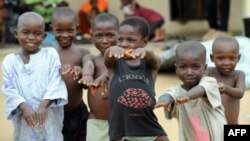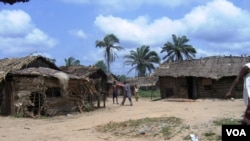YAOUNDE, CAMEROON —
Residents of Bakassi - an oil-rich territory legally ceded by Nigeria to Cameroon in 2002 - have until August to decide to become Cameroonian or leave the territory. Most residents consider themselves Nigerian.
Access to the Bakassi Peninsula, located on the Atlantic coast on the Cameroon-Nigeria border, is mostly by speed boats that navigate between the rich mangroves.
The area has been heavily guarded by Cameroonian soldiers since their country took control of the territory from Nigeria on August 14, 2008.
The International Court of Justice had awarded Bakassi to Cameroon in a 2002 ruling. Nigeria eventually decided not to fight the ruling and ceded control, over the protests of many Bakassi residents.
Sporadic attacks from rebels made Cameroon's government deploy forces to maintain law and order. In one attack in February 2011, two Cameroonian soldiers were killed and 11 others were declared missing. A group called the Bakassi Freedom fighters claimed responsibility, vowing that Bakassi will find no peace under Cameroon's rule.
Nigerians constitute 90 percent of the 300,000 people on the peninsula and will have to obtain residence permits and be treated as foreign nationals living in Cameroon if they decide to stay after the August 14 deadline given to them by the ICJ.
Many of the Nigerians are still undecided on if they will leave or not. Forty-year-old Glory Benson, a Nigerian teacher, says they have a lot of worries.
"Let us just go to the aspect of women that are pregnant. For the women to deliver here is not an easy task. So we want the government to provide a midwife in the hospital here that can be helping us. To be sincere the life here has been very good in terms of security and every thing," Benson said.
Most Nigerians who live in the territory are fishermen. They have created an association to take care of their needs. Their president James Nande, who is about 50 years old, says the main problem that may force them to leave is that Cameroon's government has taken little care to protect their huts, threatened by waters from the Atlantic.
James Nande says the only problem they have is that water from the ocean is destroying their houses and adds that he is worried because that is where he struggles to raise money and send his children to school.
Ever since the ICJ ruling, the payment of taxes was suspended, but beginning August 14, residents of Bakassi will have to start paying their share. James Nande says although some of his fishermen colleagues have been protesting, he wants them to respect that civic responsibility.
He says when the time comes, they will have to pay, adding that even in Nigeria when somebody gets to the standard of paying taxes, he has to pay, but in their village, Djabani in the Bakassi Peninsula, people have not been paying.
Nigerian-born Tom Efiom repairs engine boats in Bakassi. He wants to return to Nigeria but only if is assured that he can get another job.
Efiom says he will not go to Nigeria because he has no handwork to do there. He says for the time being, it is only in Cameroon that he has the job of an engine boat repairer, and that even though he is living in Cameroon, people use Nigerian currency, the Naira, because CFA Francs used in Cameroon are difficult to come by.
The legacy left by Nigeria is still very present. Nigerians trained many health staff and teachers who are now working for Cameroon. Even though Cameroon has sent its own teachers to the area, pupils and their parents still prefer the Nigerian system of education they have been acquainted with.
Muffu Chong Pierre, the 35-year-old teacher at a Djabani primary school created by Cameroon, said she and her colleagues are trying to convince parents to keep their children in school.
"The parents are very mobile, they are not stable. They travel with their children to sell. When we struggle to bring up the children, as soon as they know how to read and write, the parents take them to Nigeria at times. When we find it very difficult to get the children at school, I personally and my staff we move from door to door. We do hhat they call educational evangelism, so as to encourage the children to come to school," Pierre said.
Cameroon has been struggling to make the people, especially the children learn national symbols like the national anthem.
Cameroon still has to guarantee the fundamental rights of Nigerians, before gaining full control of Bakassi, according to the ICJ verdict and the Green tree agreement that Cameroon signed with Nigeria under the supervision of the United Nations.
Tanda, a Cameroonian expert on Bakassi, thinks that the peace process is right on course.
"The peace process is progressing, the population is getting to know the Cameroon administration better and better. There is consciousness now that acts of vandalism, piracy or questioning Cameroons sovereignty does not pay. And we are hopeful that by the month of August, things will be much better," Tanda said.
In line with the ICJ ruling, as of this August 14, Cameroon will govern Bakassi like any other part of its territory.
Access to the Bakassi Peninsula, located on the Atlantic coast on the Cameroon-Nigeria border, is mostly by speed boats that navigate between the rich mangroves.
The area has been heavily guarded by Cameroonian soldiers since their country took control of the territory from Nigeria on August 14, 2008.
The International Court of Justice had awarded Bakassi to Cameroon in a 2002 ruling. Nigeria eventually decided not to fight the ruling and ceded control, over the protests of many Bakassi residents.
Sporadic attacks from rebels made Cameroon's government deploy forces to maintain law and order. In one attack in February 2011, two Cameroonian soldiers were killed and 11 others were declared missing. A group called the Bakassi Freedom fighters claimed responsibility, vowing that Bakassi will find no peace under Cameroon's rule.
Nigerians constitute 90 percent of the 300,000 people on the peninsula and will have to obtain residence permits and be treated as foreign nationals living in Cameroon if they decide to stay after the August 14 deadline given to them by the ICJ.
Many of the Nigerians are still undecided on if they will leave or not. Forty-year-old Glory Benson, a Nigerian teacher, says they have a lot of worries.
"Let us just go to the aspect of women that are pregnant. For the women to deliver here is not an easy task. So we want the government to provide a midwife in the hospital here that can be helping us. To be sincere the life here has been very good in terms of security and every thing," Benson said.
Most Nigerians who live in the territory are fishermen. They have created an association to take care of their needs. Their president James Nande, who is about 50 years old, says the main problem that may force them to leave is that Cameroon's government has taken little care to protect their huts, threatened by waters from the Atlantic.
James Nande says the only problem they have is that water from the ocean is destroying their houses and adds that he is worried because that is where he struggles to raise money and send his children to school.
Ever since the ICJ ruling, the payment of taxes was suspended, but beginning August 14, residents of Bakassi will have to start paying their share. James Nande says although some of his fishermen colleagues have been protesting, he wants them to respect that civic responsibility.
He says when the time comes, they will have to pay, adding that even in Nigeria when somebody gets to the standard of paying taxes, he has to pay, but in their village, Djabani in the Bakassi Peninsula, people have not been paying.
Nigerian-born Tom Efiom repairs engine boats in Bakassi. He wants to return to Nigeria but only if is assured that he can get another job.
Efiom says he will not go to Nigeria because he has no handwork to do there. He says for the time being, it is only in Cameroon that he has the job of an engine boat repairer, and that even though he is living in Cameroon, people use Nigerian currency, the Naira, because CFA Francs used in Cameroon are difficult to come by.
The legacy left by Nigeria is still very present. Nigerians trained many health staff and teachers who are now working for Cameroon. Even though Cameroon has sent its own teachers to the area, pupils and their parents still prefer the Nigerian system of education they have been acquainted with.
Muffu Chong Pierre, the 35-year-old teacher at a Djabani primary school created by Cameroon, said she and her colleagues are trying to convince parents to keep their children in school.
"The parents are very mobile, they are not stable. They travel with their children to sell. When we struggle to bring up the children, as soon as they know how to read and write, the parents take them to Nigeria at times. When we find it very difficult to get the children at school, I personally and my staff we move from door to door. We do hhat they call educational evangelism, so as to encourage the children to come to school," Pierre said.
Cameroon has been struggling to make the people, especially the children learn national symbols like the national anthem.
Cameroon still has to guarantee the fundamental rights of Nigerians, before gaining full control of Bakassi, according to the ICJ verdict and the Green tree agreement that Cameroon signed with Nigeria under the supervision of the United Nations.
Tanda, a Cameroonian expert on Bakassi, thinks that the peace process is right on course.
"The peace process is progressing, the population is getting to know the Cameroon administration better and better. There is consciousness now that acts of vandalism, piracy or questioning Cameroons sovereignty does not pay. And we are hopeful that by the month of August, things will be much better," Tanda said.
In line with the ICJ ruling, as of this August 14, Cameroon will govern Bakassi like any other part of its territory.





